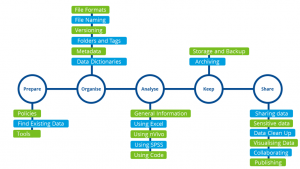Managing Your Research Data Online
Case study 2 – Managing Your Research Data online course
The client:
The Research Data Management (ReDa) project, a collaboration between the University of Adelaide’s Information Technology & Digital Services (ITDS) department and the University Library.
The task:
Support Higher Degree by Research (HDR) students and early career researchers by:
- increasing awareness of best practice in research data management
- supporting them through the process of creating and submitting a research data management plan
Background:
The ReDa project was created to implement several tools for managing and publishing research data, namely figshare and LabArchives, and encourage their use by researchers. An online course wasn’t part of the original project brief but while working with our researcher focus groups we uncovered the fact that they also felt the need for more general resources and support around research data management.
The process:
We created a working group consisting of researchers, research support librarians (who were currently running a face-to-face course on preparing data management plans), a colleague from the IT Training team and I. Together we worked through a backwards design process to identify measurable outcomes. Based on that process we decided to create an online course around research data management that would precede and complement a more specialised face-to-face course.
We designed the course in such a way that it could be completed in a linear fashion or dipped into as needed. We chose this approach based on the Five Moments of Need learning theory and because it recognised researchers’ varied levels of prior knowledge. The course content was based on the concept of the research life cycle and divided into 5 sub-sections:
- Prepare
- Organise
- Analyse
- Keep
- Share
We used Articulate Storyline 2 to create interactive elements and Twine to create a “choose your own adventure” branching scenario around data storage. In order to measure the effectiveness of the learning outcomes we created assessment in the form of a worksheet, in which students collected the information that they needed in order to complete their data management plans. Submitting the worksheet also meant that they could gain points as part of their compulsory Career and Research Skills Training (CaRST).
The outcome:
HDR students said that the course was very helpful and a useful learning resource. By reviewing the assessment worksheet we were also able to see that students were applying the concepts that they’d learned and we could then provide individual feedback and suggestions for tools to investigate. We received positive feedback from the research community not only within the University of Adelaide but also more widely via the Australian National Data Service (ANDS).

